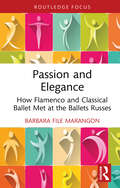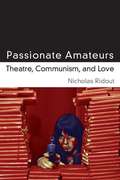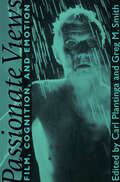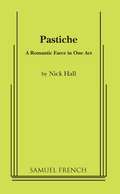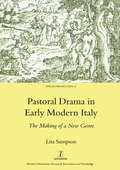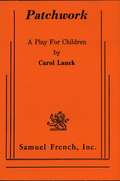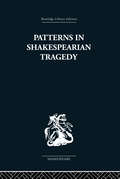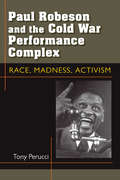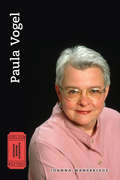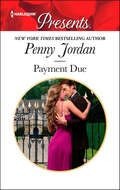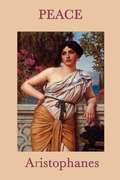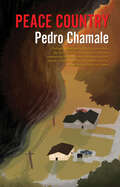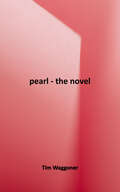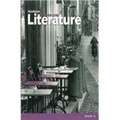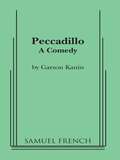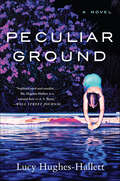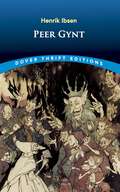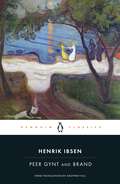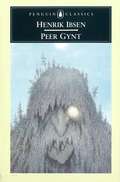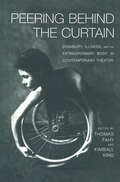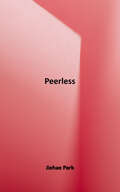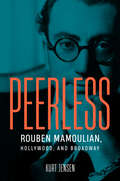- Table View
- List View
Passion and Elegance: How Flamenco and Classical Ballet Met at the Ballets Russes (ISSN)
by Barbara File MarangonThis book commences with the history of Indian, Egyptian, Arab, and flamenco dance, then compares and contrasts the history of both classical ballet and flamenco.The book outlines the early roots of flamenco in India, and the journey of the Romani through the Middle East and Europe up to their final destination in Spain. Alongside this, the history of classical ballet is detailed from its beginning in Italy to its later development in France. The book spans the period from the temples of India to Massine’s Spanish ballet, The Three-cornered Hat, for the Ballets Russes. The chronicle of flamenco's journey from India to Spain is important to understanding the development of classical ballet as it relates to The Three-cornered Hat, which is the culmination of the story. The evolution of costumes, space, scenery, and props is examined along with the historical parallels.This exploration is set to inspire and encourage choreographers to partner other dance forms with ballet as Leonide Massine did with flamenco in The Three-cornered Hat while also challenging the anthropological idea of the language of dance movement tracing the migration of people.
Passionate Amateurs: Theatre, Communism, And Love
by Nicholas RidoutPassionate Amateurs tells a new story about modern theater: the story of a romantic attachment to theater’s potential to produce surprising experiences of human community. It begins with one of the first great plays of modern European theater—Chekhov’s Uncle Vanya in Moscow—and then crosses the 20th and 21st centuries to look at how its story plays out in Weimar Republic Berlin, in the Paris of the 1960s, and in a spectrum of contemporary performance in Europe and the United States. This is a work of historical materialist theater scholarship, which combines a materialism grounded in a socialist tradition of cultural studies with some of the insights developed in recent years by theorists of affect, and addresses some fundamental questions about the social function and political potential of theater within modern capitalism. Passionate Amateurs argues that theater in modern capitalism can help us think afresh about notions of work, time, and freedom. Its title concept is a theoretical and historical figure, someone whose work in theater is undertaken within capitalism, but motivated by a love that desires something different. In addition to its theoretical originality, it offers a significant new reading of a major Chekhov play, the most sustained scholarly engagement to date with Benjamin’s “Program for a Proletarian Children’s Theatre,” the first major consideration of Godard’s La chinoise as a “theatrical” work, and the first chapter-length discussion of the work of The Nature Theatre of Oklahoma, an American company rapidly gaining a profile in the European theater scene. Passionate Amateurs contributes to the development of theater and performance studies in a way that moves beyond debates over the differences between theater and performance in order to tell a powerful, historically grounded story about what theater and performance are for in the modern world.
Passionate Playgoing in Early Modern England
by Allison P. HobgoodAllison P. Hobgood tells a new story about the emotional experiences of theatregoers in Renaissance England. Through detailed case studies of canonical plays by Shakespeare, Jonson, Kyd and Heywood, the reader will discover what it felt like to be part of performances in English theatre and appreciate the key role theatregoers played in the life of early modern drama. How were spectators moved - by delight, fear or shame, for example - and how did their own reactions in turn make an impact on stage performances? Addressing these questions and many more, this book discerns not just how theatregoers were altered by drama's affective encounters, but how they were undeniable influences upon those encounters. Overall, Hobgood reveals a unique collaboration between the English world and stage, one that significantly reshapes the ways we watch, read and understand early modern drama.
Passionate Views: Film, Cognition, and Emotion
by Carl Plantinga and Greg M. SmithThe movie theater has always been a place where people come together to share powerful emotional experiences, from the fear generated by horror films and the anxiety induced by thrillers to the laughter elicited by screwball comedies and the tears precipitated by melodramas. Indeed, the dependability of movies to provide such experiences lies at the center of the medium's appeal and power. Yet cinema's ability to influence, even manipulate, the emotions of the spectator is one of the least-explored topics in film theory today.In Passionate Views, thirteen internationally recognized scholars of film studies, philosophy, and psychology explore the emotional appeal of the cinema. Employing a novel cognitive perspective, the volume investigates the relationship between genre and emotion; explores how film narrative, music, and cinematic techniques such as the close-up are used to elicit emotion; and examines the spectator's identification with and response to film characters.An impressive range of films and topics is brought together by Carl Plantinga and Greg M. Smith, including: the success of Stella Dallas and An Affair to Remember as tearjerkers; the power of Night of the Living Dead to inspire fear and disgust; the sublime evoked in The Passion of Joan of Arc, Aguirre, the Wrath of God, and The Children of Paradise; the emotional basis of film comedy as seen in When Harry Met Sally; the use of cinematic cues in Raiders of the Lost Ark and Local Hero to arouse emotions; the relationship between narrative flow and emotion in Once Upon a Time in the West and E.T.; the emotive use of music in The Elephant Man and A Clockwork Orange; Stranger than Paradise's sense of timing; desire and resolution in Casablanca; audience identification with the main characters in Groundhog Day and The Crying Game; portrayal of perversity in The Silence of the Lambs, Flaming Creatures, and Shivers; and empathy elicited through closeups of actors' faces in Yankee Doodle Dandy and Blade Runner.Passionate Views offers a new approach to our understanding of film and will be of interest to anyone fascinated by the emotional power of motion pictures and their relationship to the central concerns of our lives, as well as by the techniques filmmakers use to move an audience.
Pastiche
by Nick HallRomantic Farce. Nick Hall . Characters: 2 male, 2 female. Interior Set . Sir Peter, has planned a dinner for two. His companion is Viola, a young chorus girl. But he's forgotten it's his wedding anniversary-- his wife, Lady Alexandra, comes home early and aided by the butler, Medford, turns Sir Peter's evening into a shambles. Medford interrupts the dinner disguised as a policeman-- then Lady Alexandra appears in a Salvation Army uniform-- then Medford in the guise of a gypsy violinist-- and finally the two of them disguised as Sir Peter's parents. Viola-- unlike Sir Peter-- is unaware of their true identity and leaves in a huff. Sir Peter and his wife make up and sit down to an anniversary supper.
Pastoral Drama in Early Modern Italy: The Making of a New Genre
by Lisa Sampson"Emerging in Italy in the mid-sixteenth century, pastoral drama is one of the most characteristic genres of its time. Sampson traces its uneven development into the following century by exploring masterpieces by Tasso and Guarini, and many lesser known works, some by women writers. She examines the treatment of key themes of love, the Golden Age, and Nature and Art against the background of the textual and stage production of the plays. An investigation of critical writings associated with the genre further reveals its significance to the contemporary literary scene, by stimulating 'modernizing' attitudes towards the canon, as well as new enquiries into the function and possibilities of art."
Patchwork
by Carol LauckComedy / 2m, 2f, minimum / Flexible staging / A cleverly designed ensemble of old fashioned fables and contemporary foibles, Patchwork is stitched together with wit and wisdom. Fast paced, funny and thought provoking, each scene is visually and mentally stimulating. Promising at the start to ". . . wiggle your giggle and tickle your noodle", the actors play 41 roles in 14 scenes. Each scene is introduced by a patch ready to be sewn, with the completed quilt presented at the conclusion.
Patkatha Lekhan Ek Parichay: पटकथा लेखन एक परिचय
by Manohar Shyam Joshiपटकथा-लेखन एक हुनर है। अंग्रेजी में पटकथा-लेखन के बारे में पचासों किताबें उपलब्ध हैं और विदेशों के, खासकर अमेरिका के, कई विश्वविद्यालयों में पटकथा- लेखन के बाक़ायदा पाठ्यक्रम चलते हैं। लेकिन भारत में इस दिशा में अभी तक कोई पहल नहीं हुई। हिन्दी में तो पटकथा-लेखन और सिनेमा से जुड़ी अन्य विधाओं के बारे में कोई अच्छी किताब छपी ही नहीं है। इसकी एक वजह यह भी है कि हिन्दी में सामान्यतः यह माना जाता रहा है कि लिखना चाहे किसी भी तरह का हो, उसे सिखाया नहीं जा सकता। कई बार तो लगता है कि शायद हम मानते हैं कि लिखना सीखना भी नहीं चाहिए। यह मान्यता भ्रामक है और इसी का नतीजा है कि हिन्दी वाले गीत-लेखन, रेडियो, रंगमंच, सिनेमा, टी.वी. और विज्ञापन आदि में ज़्यादा नहीं चल पाए। लेकिन इधर फिल्म व टी.वी. के प्रसार और पटकथा- लेखन में रोजगार की बढ़ती संभावनाओं को देखते हुए अनेक लोग पटकथा-लेखन में रुचि लेने लगे हैं, और पटकथा के शिल्प की आधारभूत जानकारी चाहते हैं। अफसोस कि हिन्दी में ऐसी जानकारी देने वाली पुस्तक अब तक उपलब्ध ही नहीं थी। ‘पटकथा-लेखन: एक परिचय’ इसी दिशा में एक बड़ी शुरुआत है, न सिर्फ इसलिए कि इसके लेखक सिद्ध पटकथाकार मनोहर श्याम जोशी हैं, बल्कि इसलिए भी कि उन्होंने इस पुस्तक की एक-एक पंक्ति लिखते हुए उस पाठक को ध्यान में रखा है जो फिल्म और टी.वी. में होने वाले लेखन का ‘क, ख, ग’ भी नहीं जानता। प्राथमिक स्तर की जानकारियों से शुरू करके यह पुस्तक हमें पटकथा-लेखन और फिल्म व टी.वी. की अनेक माध्यमगत विशेषताओं तक पहुँचाती है; और सो भी इतनी दिलचस्प और जीवन्त शैली में कि पुस्तक पढ़ने के बाद आप स्वतः ही पटकथा पर हाथ आजमाने की सोचने लगते हैं।
Patterns in Shakespearian Tragedy (Methuen Library Reprints)
by Irving RibnerFirst published in 1960. Patterns in Shakespearian Tragedy is an exploration of man's relation to his universe and the way in which it seeks to postulate a moral order. Shakespeare's development is treated accordingly as a growth in moral vision. His movement from play to play is carefully explored, and in the treatment of each tragedy the emphasis is on the manner in which its central moral theme shapes the various elements of drama
Paul Robeson and the Cold War Performance Complex
by Tony PerucciActor and singer Paul Robeson's performances inOthello,Show Boat, andThe Emperor Jonesmade him famous, but his midcentury appearances in support of causes ranging from labor and civil rights to antilynching and American warmongering made him notorious. When Robeson announced at the 1949 Paris Peace Conference that it was "unthinkable" for blacks to go to war against the Soviet Union, the mainstream American press declared him insane. Notions of Communism, blackness, and insanity were interchangeably deployed during the Cold War to discount activism such as Robeson's, just a part of an array of social and cultural practices that author Tony Perucci calls the Cold War performance complex. Focusing on two key Robeson performances---the concerts in Peekskill, New York, in 1949 and his appearance before the House Committee on Un-American Activities in 1956---Perucci demonstrates how these performances and the government's response to them are central to understanding the history of Cold War culture in the United States. His book provides a transformative new perspective on how the struggle over the politics of performance in the 1950s was also a domestic struggle over freedom and equality. The book closely examines both of these performance events as well as artifacts from Cold War culture---including congressional documents, FBI files, foreign policy papers, the popular literature on mental illness, and government propaganda films---to study the operation of power and activism in American Cold War culture.
Paula Vogel
by Joanna MansbridgePaula Vogel's plays, including the Pulitzer-prizewinning How I Learned to Drive, initiate a conversation with contemporary culture, staging vexed issues like domestic violence, pornography, and AIDS. She does not write "about" these concerns, but instead examines how they have become framed as "issues"-as sensationalized topics-focusing on the histories and discourses that have defined them and the bodies that bear their meanings. Mobilizing campy humor, keen insight, and nonlinear structure, her plays defamiliarize the identities and issues that have been fixed as "just the way things are." Vogel crafts collage-like playworlds that are comprised of fragments of history and culture, and that are simultaneously inclusive and alienating, familiar and strange, funny and disturbing. At the center of these playworlds are female characters negotiating with the images and discourses that circumscribe their lives and bodies. In this, the first book-length study of Vogel and her work, Joanna Mansbridge explores how Vogel's plays speak back to the canon, responding to and rewriting works by William Shakespeare, Edward Albee, Sam Shepard, and David Mamet, rearranging their plots, revising their conflicts, and recasting their dramatis personae. The book examines the theories shaping the playwright and her plays, the production and reception of her work, and the aesthetic structure of each play, grounding the work in cultural materialist, feminist and queer theory, and theater and performance studies scholarship.
Payment Due (Penny Jordan Collection)
by Penny JordanRead this classic romance by New York Times bestselling author Penny Jordan, now available for the first time in e-book! He called her a conniving female…And then James Warren accused Tania of deliberately destroying his sister’s marriage. He vowed to make her pay for it.Tania was an innocent bystander to the tangle of lies and deceit that surrounded the Forbeses’ marriage. Yet unless she could make James believe it, she could say goodbye to her hopes of establishing a new life for herself and her daughter in the idyllic village of Appleford.Even worse, James was just the sort of man she might have been attracted to under different circumstances. Not that Tania could admit that to herself—let alone to James!Originally published in 1991
Peace
by AristophanesA rollicking attack on war-makers, the farmer-hero makes his famous trip to heaven on a dung beetle to discuss the issues with Zeus.
Peace Country
by Pedro ChamaleA new political party has swept into office, promising big changes to curb the impending climate crisis—changes that could put the nail in the coffin for a tiny carbon-economy town in the heart of Northern BC. When an elected representative who grew up in the town arrives to appease the residents, her urban idealism clashes with the hard-hitting realities faced by her family and childhood friends. How will pulling the plug on fossil-fuel dependency play out for this resilient northern community? And does it even matter when a forest fire is encroaching on the town’s borders?Inspired by playwright Pedro Chamale's own experiences growing up in Chetwynd, BC, Peace Country is a poignant plea for dialogue in a time marked by profound division. Teetering between progress and preservation, this very human drama invites readers to contemplate the fate of communities standing on the precipice of ruin.
Pearl: The Novel
by Tim WaggonerBased on the film written by Ti West and Mia Goth and directed by Ti West The X-traordinary origin story! It’s 1918, and Pearl, a young woman on the brink of madness, must tend to her ailing father under the bitter and overbearing watch of her devout mother. Lusting for the glamorous life she’s seen in the movies, Pearl’s ambitions, temptations, and repressions collide… Written by four-time Bram Stoker Award-winning writer Tim Waggoner, this thrilling novelization is printed in throwback pocket-sized paperback format, bringing Ti West's bloody prequel to a new medium. Go back in time again as Pearl slashes her way to stardom with gory new details drawn from West and Goth's original screenplay.
Peccadillo
by Garson KaninComedy / Garson Kanin / 4 m, 2 f / 2 Interiors / Maestro Vito De Angelis, an egomaniacal but charming conductor, is under contract to a major publisher to deliver his autobiography. The publisher has paid a huge advance and Vito has just fired his fifth ghost writer. The publisher sends pretty Iris Peabody, knowing that Vito is a sucker for the ladies, to gain his cooperation as she ghost writes the book. The stratagem works, a fact that distresses Mrs. Vito, former opera star Rachel Garland. She hires a handsome young ghost writer to write her autobiography: Mrs. Maestro. Christopher Plummer, Glynis Johns and Kelly McGillis starred in this light hearted romp by the author of Born Yesterday. / "Those who adore well constructed comedy will go berserk." Buffalo News.
Peculiar Ground: A Novel
by Lucy Hughes-Hallett“Sophisticated and erudite. . . . Hughes-Hallett is a natural heir to A.S. Byatt, delivering a densely patterned novel that shimmers with human interest as it probes our cultural story.”—Wall Street JournalThe Costa Award-winning author of The Pike makes her literary fiction debut with an extraordinary historical novel in the spirit of Wolf Hall and Atonement—a great English country house novel, spanning three centuries, that explores surprisingly timely themes of immigration and exclusion.It is the seventeenth century and a wall is being raised around Wychwood, transforming the great house and its park into a private realm of ornamental lakes, grandiose gardens, and majestic avenues designed by Mr. Norris, a visionary landscaper. In this enclosed world everyone has something to hide after decades of civil war. Dissenters shelter in the woods, lovers rendezvous in secret enclaves, and outsiders—migrants fleeing the plague—find no mercy.Three centuries later, far away in Berlin, another wall is raised, while at Wychwood, an erotic entanglement over one sticky, languorous weekend in 1961 is overshadowed by news of historic change. Young Nell, whose father manages the estate, grows up amid dramatic upheavals as the great house is invaded: a pop festival by the lake, a television crew in the dining room, a Great Storm brewing. In 1989, as the Cold War peters out, a threat from a different kind of conflict reaches Wychwood’s walls.Lucy Hughes-Hallett conjures an intricately structured, captivating story that explores the lives of game keepers and witches, agitators and aristocrats; the exuberance of young love and the pathos of aging; and the way those who try to wall others out risk finding themselves walled in. With poignancy and grace, she illuminates a place where past and present are inextricably linked by stories, legends, and history—and by one patch of peculiar ground.
Peer Gynt (Dover Thrift Editions #2)
by Henrik IbsenAmong the masterpieces of world literature, this early verse drama by the celebrated Norwegian playwright humorously yet profoundly explores the virtues, vices, and follies common to all humanity — as represented in the person of Peer Gynt, a charming but irresponsible young peasant. Based on Norwegian folklore and Ibsen’s own imaginative inventions, the play relates the roguish life of the world-wandering Peer, who finds wealth and fame — but never happiness — although he is redeemed by love in the end.As the play opens the young farmer attends a wedding and meets Solveig, the woman who is eventually to be his salvation. However, the rascally Peer then kidnaps the bride and later abandons her in the wilderness. This dismal performance is followed by a string of adventures (many of which do not reflect well on Peer) in many lands. After these soul-chilling exploits, an old and embittered Peer returns to Norway, eventually finding solace in the arms of the faithful Solveig.Like other early Ibsen plays, such as Brand (1866) and Emperor and Galilean (1874), the work is imbued with poetic mysticism and romanticism, and in Peer we find a rebellious central character in search of an ultimate truth that always seems just out of reach. In this sense Peer can be seen as an alter ego of Ibsen himself, whose lifelong search for artistic and moral certainties resulted in the great later plays (Hedda Gabler, The Wild Duck, An Enemy of the People, etc.) upon which his reputation chiefly rests. This rich, poetic version of Peer Gynt is considered the standard translation.
Peer Gynt and Brand
by Henrik IbsenA new Penguin edition of Ibsen's two great verse plays, in masterful versions by one of our greatest living poets, Geoffrey Hill. These two powerful and contrasting verse dramas by Ibsen made his reputation as a playwright. The fantastical adventures of the irrepressible Peer Gynt - poet, idler, procrastinator, seducer - draw on Norwegian folklore to conjure up mountains, kidnappings, shipwrecks and trolls in an exuberant examination of truth and the self; while Brand, an unsparing vision of an idealistic priest who lives by his steely faith, explores free will and sacrifice. This volume brings together the poet Geoffrey Hill's acclaimed stage version of Brand with a new poetic rendering of Peer Gynt, published for the first time.This Penguin edition includes an interview with Geoffrey Hill about recreating Ibsen in English, an introduction by Janet Garton and editorial materials by Tore Rem.
Peer Gynt: A Dramatic Poem (Classics)
by Henrik Ibsen Peter WattsThis high-spirited poetical fantasy, based on Norwegian folklore, is the story of an irresponsible, lovable hero. After its publication, Ibsen abandoned the verse form for more realistic prose plays.
Peering Behind the Curtain: Disability, Illness, and the Extraordinary Body in Contemporary Theatre (Studies in Modern Drama #18)
by Thomas Fahy Kimball KingFirst Published in 2002. Routledge is an imprint of Taylor & Francis, an informa company.
Peerless
by Jiehae ParkAsian-American Twins M and L have given up everything to get into The College. So when D, a one-sixteenth Native American classmate, gets "their" spot instead, they figure they've got only one option: kill him. A darkly comedic take on Shakespeare's Macbeth about the very ambitious and cut-throat world of high school during college admissions.
Peerless: Rouben Mamoulian, Hollywood, and Broadway (Wisconsin Film Studies)
by Kurt JensenA proud Armenian who claimed a distant link to nobility, born in what was then part of czarist Russia, Rouben Mamoulian (1897–1987) was one of the most astonishing and confounding figures in American film and theater, directing the original stage productions of Porgy and Bess, Carousel, and Oklahoma!, as well as films including Love Me Tonight, Queen Christina, City Streets, and Silk Stockings. He was famously fired from the film version of Porgy and Bess in a dispute over publicity and quit Cleopatra after arguments over a single scene. Mamoulian’s mercurial confidence and autocratic tendencies were among the reasons he had a reputation for being uncompromising. This frustrating mix of genius and stubbornness, of critical successes and financial flops, has proven challenging for biographers. Kurt Jensen’s magisterial volume, extensively researched and filled with trenchant observations, brings to life this charming, flawed, and fascinating man—and demonstrates how the wellspring of his art contained the seeds of his own destruction. Drawing upon Mamoulian’s unfinished memoir and voluminous diaries, as well as interviews with the director’s surviving collaborators, Jensen delivers fresh and informative insider stories from seminal productions. Meanwhile, he explores Mamoulian’s aesthetic principles and strategies as manifested in lighting, choreography, and sound design. A tour de force, Peerless offers readers a multifaceted, in-depth look at an idiosyncratic genius.
